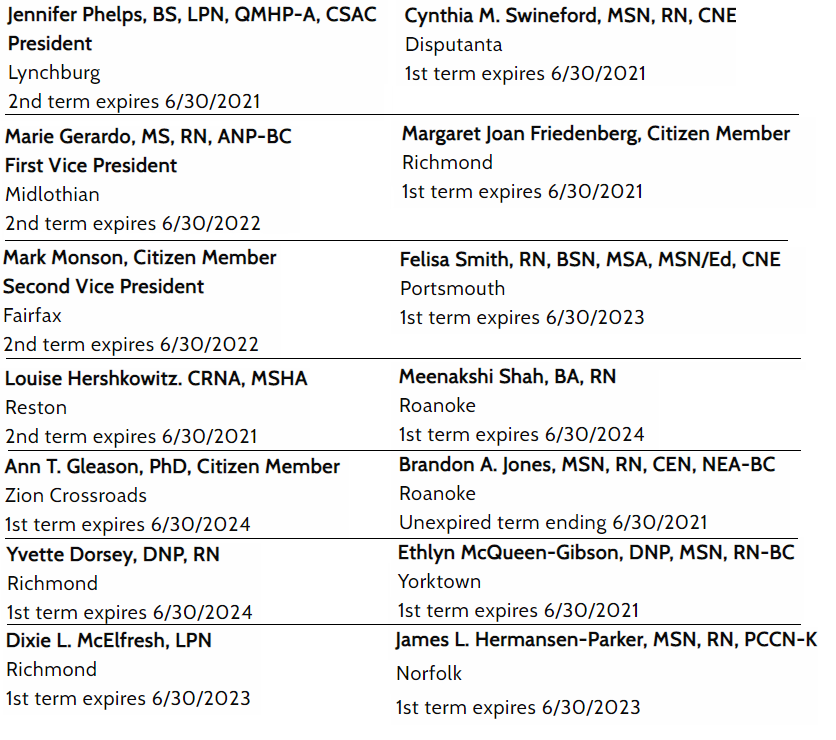Introduction
“Every nurse in the U.S. is responsible for knowing the state’s NPA and regulatory requirements for nursing for every jurisdiction in which they hold a license” (NCSBN, 2018, p. 5).
Numerous laws and regulations govern the nursing practice, and state boards of nursing carefully oversee nurses’ compliance with these regulations. To ensure the safety and high quality of patient care and the successful development of their careers, nurses should be aware of the regulations governing their practice in their state. This paper aims to explore the role of boards of nursing as compared to that of professional nurse associations, as well as some regulations governing the nursing practice in Virginia.
The Differences Between a Board of Nursing (BON) and a Professional Nurse Association
Both BONs and professional nurse associations influence the nursing practice, but there are differences between them. First of all, BONs are state agencies, while professional nurse associations are private organizations. BONs oversee nursing practice, enforce laws and regulations, and address violations to ensure that patients receive safe and high-quality care (NCSBN, 2018). In contrast, professional nurse associations, such as the American Nurses Association (ANA), are focused on advocating for the nursing profession. For example, they lobby Congress and other agencies to make sure that nurses’ voices are heard and considered when developing regulations (ANA, n.d.). BONs also accredit nursing education programs and issue and renew licenses, while professional nurse associations do not have such an authority.
Virginia Board of Nursing

In Virginia, the BON consists of 14 members, including nine registered nurses, two licensed practical nurses, and three citizen members. The picture presents all current members of the Virginia Board of Nursing, including their academic credentials, geographic distribution, practice positions, and licensure status. To become a member, one should be a US citizen and a resident of Virginia Commonwealth. A professional nurse willing to apply for membership should graduate from an approved education program and become a licensed registered nurse. A licensed practical nurse seeking membership should graduate from a high school and a practical nursing program and be licensed as a practical nurse. All applicants should have at least five years’ experience in nursing and at least three years of active engagement in professional or practical nursing in Virginia.
Virginia State Regulation Related to General Nurse Scope of Practice
BON Regulation 18VAC90-19-230 is one of the Virginia regulations that govern the general practice of nursing. It is related to the nursing discipline in the workplace. It defines the violations upon committing which nurses may be deprived of their licenses. According to the regulation, the board can revoke or suspend a license if the nurse obtained it by deceit, e.g., by providing false information (18VAC90-19-230, 2017). Further, the regulation defines types of unprofessional conduct that also lead nurses to lose their licenses. This regulation is directly related to the general nurse scope of practice since it provides guidance about what nurses should avoid in their practice.
The Influence of BON Regulation 18VAC90-19-230
The impact of BON Regulation 18VAC90-19-230 on the nurse’s role is that it obliges nurses to act within their scope of practice and not assume the responsibilities of professionals with different qualifications. By prohibiting delegating tasks to unqualified persons and requiring nurses to avoid and report cases of abuse and neglect, the regulation positively influences the safety of healthcare delivery. Nurses complying with the regulation avoid patient abuse and neglect, which leads to decreased cost of healthcare. Finally, since nurses are prohibited from receiving bribes or entering relationships with patients, it leads to fewer inequalities in access to care, which is not influenced by nurses’ personal attitudes toward patients.
State Regulation Related to Advanced Practice Registered Nurses (APRNs)
The state of Virginia has several regulations related to advanced practice registered nurses (APRNs). One of them is BON Regulation 18VAC90-40-90 (2020), which obliges APRNs to clearly describe the scope of their prescriptive authority in a practice agreement and follow this agreement in their work. Since only APRNs may have an authority to prescribe, this regulation is related to APRNs rather than the general nursing practice.
The Influence of BON Regulation 18VAC90-40-90
The influence of BON Regulation 18VAC90-40-90 (2020) on nurse practitioners’ role is that it obliges them to practice under physicians’ supervision. While it ensures that patients receive safe and high-quality care, this regulation leads to increased healthcare costs resulting from the duplication of services provided by nurse practitioners and physicians. Perhaps, the main drawback of this regulation is that it hinders access to healthcare in underserved areas. For example, in rural areas, where there is a lack of physicians, nurse practitioners could provide healthcare to patients without physicians’ oversight. However, this regulation prohibits them from doing so, which prevents the state from reducing inequalities in access to healthcare.
Conclusion
Nursing regulations influence all aspects of nursing practice, including healthcare delivery, cost, and access to it. BONs’ task is to oversee nurses’ compliance with regulations, and, in care of violations, nurses can be deprived of their licenses. As practice shows, not all regulations lead to unequivocal positive effects on healthcare. In such cases, it is the mission of professional nurse associations to advocate for changes in regulations and policies to improve the nursing practice and patient outcomes resulting from it.
References
American Nurses Association [ANA] (n.d.) Federal issues. Web.
18VAC90-19-230 Disciplinary Provisions (2017). Web.
18VAC90-40-90 Practice agreement (2020). Web.
National Council of State Boards of Nursing [NCSBN] (2018). What every nurse needs to know about state and territorial boards of nursing. Web.
Va. Code §54.1-3003 (1988). Web.
Virginia Board of Nursing. (n.d.). Board members. Web.